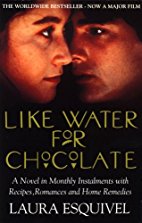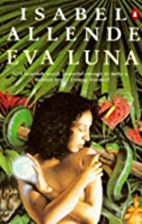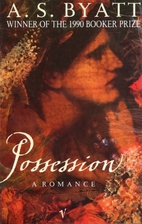I enjoy reading the responses to Kate’s Six Degrees of Separation challenge over on Books are my Favourite and Best, but I’ve never done one myself. That is, until now.
The starting point for October’s challenge is Laura Esquivel’s excellent Like Water for Chocolate.

My best friend lent me this book when we were at university. I loved it so much, particularly the way Tita’s emotions seep into the food she cooks and subsequently control those who eat it. I loved the way each chapter is preceded by a recipe connected to an experience in Tita’s life.
This reminds me of another book that links the emotions of a cook with the food they prepare.

The Particular Sadness of Lemon Cake examines how hard it can be to love someone when you know the secrets they hide from the world.
Both Laura Esquivel’s book and Aimee Bender’s use magical realism to create intensely vivid worlds that exist in between reality and dreams.

Isabel Allende’s Eva Luna recalls Scheherazade in the way Eva uses story telling and magical realism to ensure her own survival. That makes me think about a book my husband bought me.

The Dove’s Necklace weaves the stories of two women and the body of an unclaimed woman, found in an alley close to the Kaaba, who could be either of them or both, with stories of the men who love the women and try to control them. Along the way, characters are revealed to not be who the reader thinks they are.
The dove is a bird usually kept in a cage, and Raja Alem’s book speaks of women kept caged by the society they are members of.

Margaret Drabble’s debut novel, A Summer Birdcage, also reflects on social conventions and the expectations women in the 60s were beginning to push against. It’s also about how the people we think we know well (sisters) sometimes aren’t that person at all.
Margaret Drabble is, of course, the younger sister of A S Byatt. The only book I’ve read of hers is also one of my most re-read books.

Possession is a time travelling tale that plays out in the pages of a secret archive of letters that reveal a love affair between two Victorian poets. It contains many of my favourite things: archives, research, Whitby, women pushing back against what is expected of them, and love of many types.
So there we are. My first attempt at a six degrees challenge. I’ve managed to choose books solely by women, as well, and a couple by women in translation. Why not head over to Kate’s blog and join in?
I love this – what a great idea! I’m intrigued by Like Water For Chocolate – will have to check it out (from the library… at some point in the future… not now!).
LikeLike
You must, it’s a wonderful book. I must have read it 26 years ago, and I still think about the characters. Are you going to do a list? You don’t have to have read the books you put on it.
LikeLike
Yes I’ll have a think!
LikeLiked by 1 person
I had no idea Margaret Drabble was related to AS Byatt! Like you, I think Possession is the only book I’ve read of Byatt’s, and I haven’t read any Drabble. Shame on me.
LikeLike
Drabble is my favourite. She’s funny and feisty and accessible. The first one I read by her was The Millstone. I devoured her section in Sheffield library when I lived there. A Summer Bird Cage, The Garrick Year, and Jerusalem the Golden are stand outs of the half dozen I read then. I’ve a bunch of her more recent titles on my pile. Give her a whirl!
LikeLiked by 1 person
Oh I totally will then. I have meant too, but I have had a vague notion that she was imposingly literary? But if you consider her accessible then I’m probably thinking of another author.
LikeLike
I don’t find her imposing at all. She’s literary, but she writes about how life actually is. The early novels are about women in the 50s and 60s finding a new place in the world, about friendships and betrayals, and self-sufficiency. I think of A S Byatt as being imposingly literary, despite Possession being anything but!
LikeLiked by 1 person
I lurk on Kate’s blog sometimes since you’ve mentioned her, and I do like this feature, although I’ve never commented because there are always so many comments already that I don’t want to jump in. Which is silly, I know. I’ve never read Drabble or Byatt, but now I clearly must. I’ve had the same impression of Drabble as Weezelle, so I wonder where we both got it from!
LikeLike
The Misperception of Drabble should be a mystery novel. I had a binge on her books about fifteen years ago. I’ve a Kindle stack of the ones that I missed to crack on with. I need to stop doing reading challenges!
LikeLike